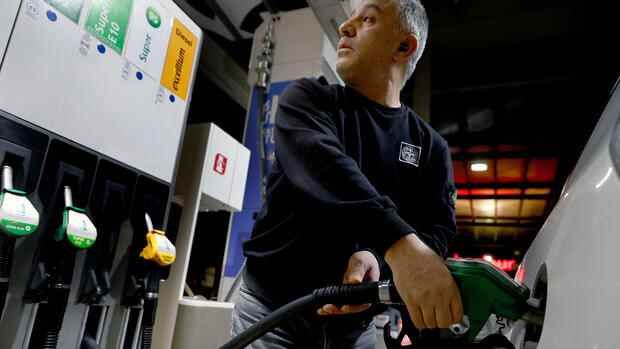If you fill up on behalf of a company, you should pay more than a private driver.
(Photo: dpa)
Brussels It is a typical compromise that often occurs in the EU: the new emissions trading for buildings and road traffic is coming, but many of them will be exempted. In the future, only companies should pay an additional CO2 tax for refueling and heating throughout Europe, private individuals will not. This is what the negotiators in the European Parliament agreed on Tuesday evening.
This was preceded by a long dispute as to whether such emissions trading makes sense at all. It was intended that CO2 taxes would have to be paid on all gas, oil, petrol and diesel sold in the EU. This should give Europeans an incentive to use fossil fuels sparingly and switch to heat pumps and electric cars.
The most important counter-argument is social hardship: Even the poorest Europeans would have been affected, while the levy would have had hardly any effect in rich countries.
According to information from the Handelsblatt, the compromise now provides for two different prices to be charged at gas stations: the normal price for private individuals and a higher price for companies. Companies would also have to pay more than private individuals when purchasing gas or heating oil.
Top jobs of the day
Find the best jobs now and
be notified by email.
If a state wants to avoid this, it must also voluntarily demand the CO2 tax from private individuals. This is explicitly permitted and has long since been introduced in some countries, including Germany.
In other states, however, a complicated and fraud-prone system would arise. Even the MPs involved are skeptical that their proposal will ever become law. In the further negotiations, the EU member states could also propose other compromises. Any law passed at EU level needs the approval of Parliament, Member States and the EU Commission.
“It is important that we create the same conditions for companies throughout Europe so that fair competition is possible,” said CDU MP Peter Liese.
>> Read here: Entrepreneur Michael Otto: “We now have a time window for an energy transition in Europe”
The maximum price of 50 euros per tonne of CO2 now proposed by Parliament has better chances of being implemented. That’s another five euros less than the EU Commission’s proposal. The new tax would make a liter of diesel up to 13 cents more expensive. The carbon price paid by industry has been above this level for about a year.
There should also be changes in emissions trading for industry, but these are still controversial within the European Parliament. It is unclear how long the industry will benefit from freely allocated CO2 certificates.
With their proposals, the Conservatives want to achieve a reduction in emissions of 61 percent by 2030 compared to 2005. An alternative proposal from the Social Democrats, Liberals, Greens and Left provides 67 percent. The motions are expected to be voted on next Wednesday. The Greens are optimistic that they will prevail. “Emissions trading will thus become the strongest climate lever in Europe,” said MP Michael Bloss.
More: Climate economist Ottmar Edenhofer considers a European emissions trading system for transport and buildings to be indispensable
